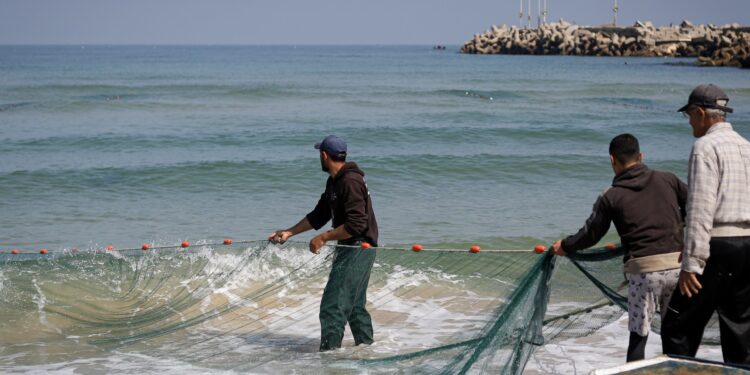11/5/2025–|Last update: 13:06 (Mecca time)
The war in the Gaza Strip is no longer measured by the number of deaths, but rather with the basics of life: food, water, tools, and the ability to stay, so the Financial Times saw in a report published yesterday.
With the Israeli siege entering its seventh month, more than 2.2 million Palestinians in the sector face the risk of starvation, while the agricultural structure collapses, hunger pushes fishermen towards the sea despite the embargo and risk, and farmers are expelled from their lands with bombing and bombs.
From a refrigerator to a survivor boat
Wajih Hammad, one of the oldest Gaza fishermen, turned to the use of a fridge door stuffed with cork boards to float on the sea, looking for sardines that block his family, consisting of 22 individuals, after Israel destroyed the Gaza port, and its fishermen lost more than a thousand boats, and Hammad and the remaining colleagues of his colleagues did not find an option other than adventure.
Water close to the beach with sanitation and hospital waste was polluted, and despite this, Hammad Linongach Times said that “hunting is forbidden, and the sea is full of death, but there is no other way; we venture ourselves, because hunger is not waiting.”
Some fishermen went to hunt small turtles, and even the dolphins that are attached to the net, then sold them in scarce markets, as the price of a kilo of sardines reached $ 30, or 5 times the price before the war.
Despite this high cost, the profits are no longer enough to secure vegetables or bread, after the price of a kilo of tomatoes exceeded 30 shekels (about 8 dollars) and the price increases according to the place and time.
The earth eroded and the hope of agriculture was extinguished
Israeli raids and bulldozing were destroyed by more than 80% of the agricultural lands in Gaza, according to the newspaper about the United Nations Food and Agriculture Organization (FAO).
While the bombs burned the fields, the herds were annihilated, the wells were destroyed, and the irrigation systems were arrested, in a position by the Financial Times, as “a systematic collapse of the sector’s ability to produce its food with its minimum.”
The farmer narrated Muslim manipulations how the shelling forced him to stop cultivating his land, northeast of Gaza, after the drones hit his farm planted with pepper, cabbage and flower.
He says that 15 of his workers have been injured during the past months, and he had to abandon the remaining spot of the land for him, after announcing a “military zone.”
“Everything disappeared … the land, the tools, the water, the life itself has become far -fetched,” he said in a loud voice.
Prices double … and customers disappear
In the Gaza markets, the remaining farmers are forced to sell vegetables at high prices that most of the population is unable to.
The farmer Kamal Al -Ra’i says that the cost of fuel jumped from 5 forms ($ 1.4) to 100 shekels ($ 28), and fertilizers are not available, forcing him to sell a kilo of tomatoes at more than 30 shekels (about 8 dollars), despite the suffering of people.
“We are not crises merchants, we are hardly survived. The cost kills us as customers kill,” the shepherd added to the newspaper.
Even the horses were not delivered
The newspaper also monitored the tragedy of the farmer Saqr Abu Raba, who was forced to abandon strawberry cultivation, and went to grow vegetables after his land was destroyed.
On October, an Israeli plane launched a missile on his farm, killing his son and two workers, and hitting him in his stomach.
Its day fled with his horse, but after two weeks, another raid hit the horse directly.
“Even the horse was not spared; I cried in front of my eyes. They do not want Gaza to feed itself, but rather they want us to be hungry until we collapse,” Abu Rabba said to the newspaper.
A multi -layer siege
Israel denies the use of starvation as a weapon or intentionally targeting civilians, but the facts documented by the Financial Times documenting a different picture, as Israel prevented the introduction of food, medicine and fuel, destroying the sources of livelihood, and expanding the military areas, all devotes a catastrophic human reality.
The Israeli government approved a plan to distribute limited quantities of aid inside the army -controlled points and private security companies, in a move described by relief organizations as “harsh and degrading.”
At the same time, it has approved an expanded military plan to re -occupy Gaza and displace its population in the south, in what the newspaper described as “an organized endeavor to dismantle the remaining social and economic structure.”
And a farmer said, looking at the remnants of its flavored crop: “We do not live, and we do not die, we are just consumed slowly.”
“They don’t want us to live, nor to die quickly; just want to suffer silently,” one of the Gazan farmers summarized the situation for the Financial Times.



